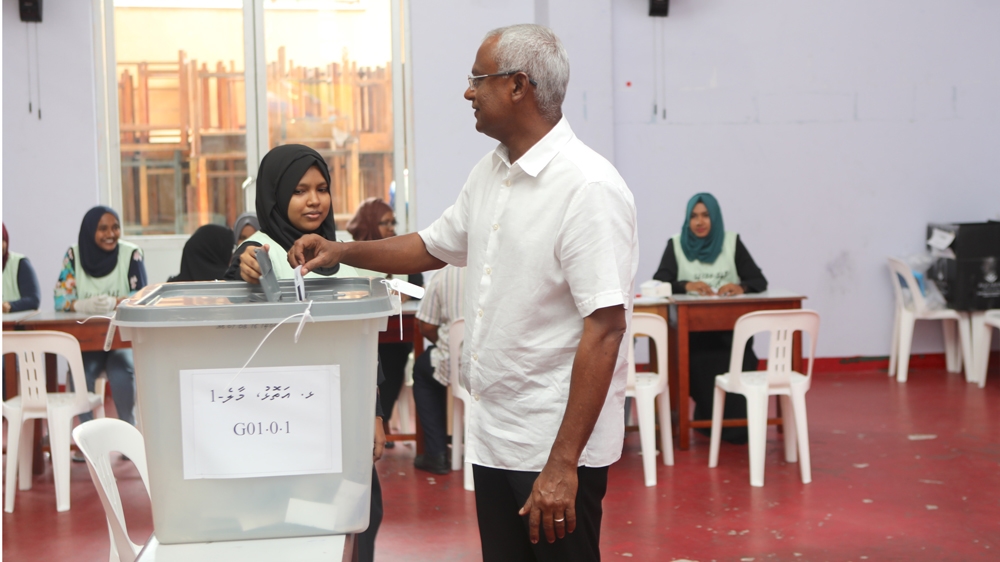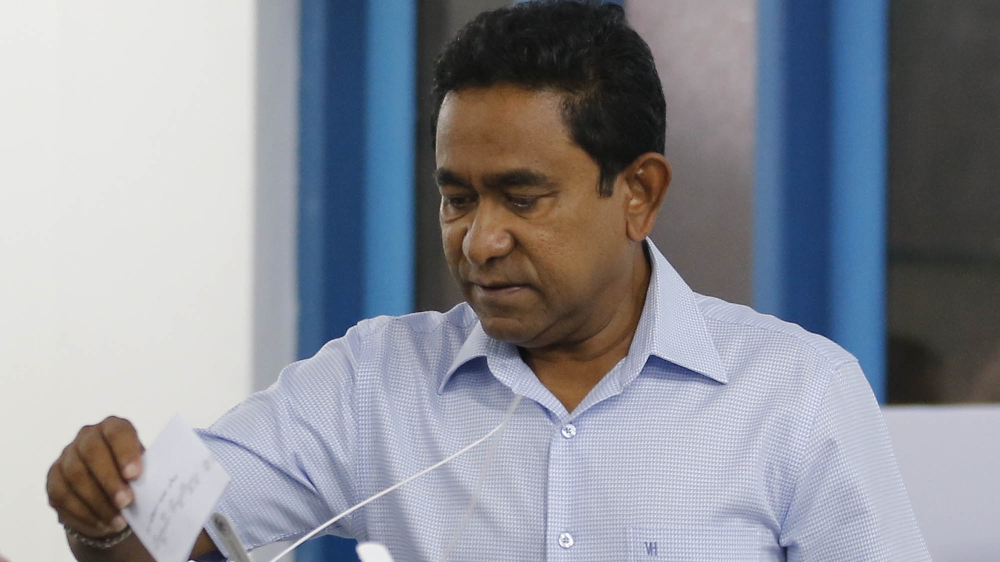Maldives election: Counting begins after ‘extraordinary turnout’
Male, Maldives – Counting is underway in the Maldives following a contentious presidential election seen as a test of democracy on the troubled island nation.
Ahmed Akram, spokesperson for the country’s election commission, said polling at most ballot boxes in the country closed at 7pm (15:00 GMT) on Sunday after the elections commission extended voting time by three hours because of “extraordinary high turnout”.
Earlier, voters in the Indian Ocean island nation complained of long delays as they queued in snaking lines across the country to cast their ballots. Some reported waiting periods of more than eight hours.
The vote, seen as a referendum on democracy, will decide whether the country’s President Abdulla Yameen will win a second five-year term.
“Voting has been extended for three hours across all polling stations, in and outside the country, because people are still queued up to vote,” said Ahmed Akram, deputy head of the national electoral body.
“There are long queues because of an extraordinary high turnout.”
Polling in the Maldives started at 8am local time (3:00 GMT) and will now close at 7pm (14:00 GMT), he said.
Sunday’s vote pits Yameen, who has presided over a wide-ranging crackdown on dissent, against opposition figure and long-time Member of Parliament, Ibrahim Mohamed Solih.
On some islands, dozens of people had started queuing up outside voting stations overnight.
Azka Adil, a 20-year-old athlete from the Maldivian capital, Male, who is voting for the first time, said she was “nervous and scared because the vote might be rigged”.
“But I am definitely voting,” she said.
More than a quarter million people, out of a population of nearly 350,000, are eligible to vote in the island nation, which has been in turmoil since its first democratically elected leader, Mohamed Nasheed, was forced out of office in 2012.
 |
| Today’s elections are regarded as a test for democracy in the island nation [Sharif Ali/Al Jazeera] |
Ahmed Ibrahim, a 28-year-old government employee who is voting for Yameen, said he was choosing “strong economic policies”.
Earlier in the day, Ahmed Shareef, president of the elections commission, told Al Jazeera voting was proceeding in “a calm and orderly manner”. He said he expected a turnout rate of more than 90 percent at ballot boxes in Male, which is home to more than one third of the country’s population.
Both Yameen and Solih cast their ballots soon after polling stations opened.
Stark choices
Yameen, who assumed power in 2013 after a disputed election, has jailed or forced into exile nearly all of his political rivals, banned protests, suspended parliament and declared two states of emergency in just five years.
Faced with widespread international criticism, he pulled the Maldives out of the Commonwealth in 2016 and fostered closer ties with China and Saudi Arabia, who have funded the country’s infrastructure boom.
Defending the Maldives’ Islamic faith and sovereignty and boosting the country’s economy were cornerstones of Yameen’s election campaign.
At a final rally in Male on Saturday, Yameen said the choice on Sunday was between Islam and “infidelity”.
 |
| Opposition candidate Ibrahim Mohamed Solih voted soon after polling stations opened [Sharif Ali/Al Jazeera] |
Solih, the opposition candidate, has vowed to restore democracy and release jailed dissidents, who include Yameen’s half-brother, Maumoon Abdul Gayoom.
The vote was “the last chance” for democracy, he told a crowd of yellow-clad supporters.
Without credible polls, it is unclear who will win and observers say they do not expect the vote to be free or fair.
The government has denied entry to most foreign election monitors and journalists. Only a handful were let in.
‘Tense and uncertain’
Mariyam Shiuna, executive director of Transparency Maldives, an election-monitoring group, said “the atmosphere is tense and uncertain” in the country especially after a police raid on the opposition’s headquarters on the eve of the election.
Officers claim they were looking for evidence of vote-buying, a move the opposition condemned as an attempt to disrupt the election.
Despite the fear, Shiuna said the huge turnout at rival rallies in Male on the final day of campaigning showed “people are keen to cast their ballots and have their say”.
“Yet, there is an eeriness to this election because anything is possible and the general feeling is that neither party will accept the results if they lose, which will lead to further chaos,” she said, urging the international community to monitor events in the Maldives closely.
 |
| President Abdulla Yameen casts his vote at a polling station [Eranga Jayawardena/The Associated Press] |
Ahmed Nihan, the leader of the ruling Progressive Party of the Maldives, said he was “confident” of a win for Yameen, after “a long and tireless campaign”.
Eva Abdulla, an opposition politician, urged voters to exercise their right to vote.
“Be alert, vote early and then get ready to protect that vote,” she said.
In the run-up to the vote, the opposition had accused the elections commission, headed by a Yameen ally, of rigging the vote, by changing vote-counting rules and appointing alleged ruling party activists to administer the vote.
The commission has dismissed the allegations as an attempt to undermine confidence in the election.
More than 2,000 local monitors are expected to observe the vote, while the European Union said it did not send observers because the country failed to meet basic conditions for monitoring.
The US has threatened to take action against officials if the vote is not free and fair and the EU said it was prepared to impose sanctions, including travel bans and freezing assets, if the situation does not improve.
Results are expected by midnight on Sunday (19:00 GMT).
Isha Afeef reported from Male. Zaheena Rasheed reported and wrote from Colombo, Sri Lanka.




